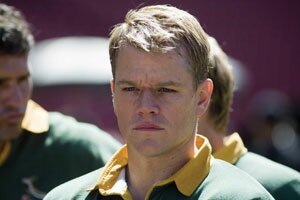MOVIE REVIEW- Indomitable <i>Invictus: </i>Eastwood and Freeman make it look easy

PUBLICITY PHOTO
With one of my acting gods, Morgan Freeman, playing one of my political gods, Nelson Mandela, Invictus couldn't help being a spiritual experience for me. Freeman's every line of dialogue– even something as simple as "Good morning"– sounded like a pronouncement from on high. That makes it hard to write an objective review. I know the movie's good, but I'm not sure it's great.
Clint Eastwood makes directing look easy, telling stories in a no-frills style that doesn't call attention to itself and remind you who's behind the camera. Freeman does the same thing as an actor, and the story they're telling is of Mandela finding relatively simple ways to begin the healing between the black and white populations of South Africa.
With everyone making it look easy, it's easy to undervalue the incredible accomplishments of all concerned; but I was certainly moved, on the verge of tears, for most of the two hours-plus.
Mandela's 1990 release after 27 years in the Robben Island prison and subsequent 1994 election as president of South Africa are covered in the first four minutes of the film; then the work begins. A newspaper headline blares, "He can win an election but can he run a country?" "It's a legitimate question," Mandela says (and one most Americans will recall having heard closer to home in the past year).
Arriving at work on the first day of his term and seeing the former administration's all-white staff packing up, Mandela invites them to stay. He can't be president of a "rainbow nation" if all the people aren't represented in his office. This strategy extends to his personal security team, where Jason Tshabalala (Tony Kgoroge) and Linga Moonsamy (Patrick Mofokeng) are surprised to be augmented by Hendrick Booyens (Matt Stern) and Etienne Feyder (Julian Lewis), former members of the Special Branch that used violence against black people.
With one of their own running the country the blacks expect vengeance and retribution for what they were subjected to under more than four decades of apartheid, but Mandela knows the country can't be united by transferring bitterness and rage from one side to the other. When the national rugby team, the Springboks, is about to be stripped of its status, Mandela intervenes.
The team is such a symbol of apartheid that whenever they play the country's blacks root for their opponent. That they're perennial losers doesn't give the whites much to be proud of, but proud they are. South Africa is hosting the 1995 Rugby World Cup Championship, and Mandela sees a chance to unite the nation behind the Springboks.
He starts by inviting team captain Francois Pienaar (Matt Damon) to tea, where they discuss leadership and inspiration and find some common ground. Though he grew up under institutionalized racism in a home where the maid's feelings were ignored, we don't know where Pienaar stood before meeting Mandela; but we see how he's affected by that meeting and by things that happen in the following year.
The team trains harder but it's not clear – unless you want to credit a miracle – how they transform from underdogs to top dogs in that time. Mandela sends them into the townships to conduct workshops with children for public relations purposes, and it works. At first the black kids are only excited to see the one black player, Chester Williams (McNeil Hendricks), but after the play with the whole team the color barriers fall away. The president's support of the team wins him some respect from the white community.
It should be noted that rugby is a lot like American football except the players don't wear helmets and padding. It's a rough game and they make our footballers look like pussies.
Much of the film's second half takes place during the World Cup games, as the Springboks defeat Australia, Western Samoa, France and move on to face the unbeatable (i.e., invictus) New Zealand team. By this time blacks and whites alike are rooting for the home team and small moments, some clichéd and some clever, show the races interacting in ways that would have been unthinkable a year earlier.
The film's title comes from the William Ernest Henley poem that ends, "I am the master of my fate: I am the captain of my soul." Mandela, who found inspiration from it in prison, passes it on to Pienaar.
The screenplay by South African native Anthony Peckham, from the book Playing the Enemy by John Carlin, makes everything seem so smooth that some false alarms have to be invented to provide some tension.
Judging from one white South African I met a year ago, things aren't as kumbaya there as the movie makes them look (it took the U.S. a century to begin to heal from slavery), but Mandela deserves his Nobel Peace Prize and Invictus deserves any prizes it wins from people who can appreciate Mandela's genius and Eastwood and Freeman's skill.
#
2 comments
Can't wait to see this movie! Invictus has a really cool Facebook fan page too: check it out: http://www.ropeofsilicon.com/article/reviews-for-eastwoods-invictus-begi...
Whoops- wrong link :) http://www.facebook.com/search/?q=invictus&init=quick#/invictus?v=wall&r...